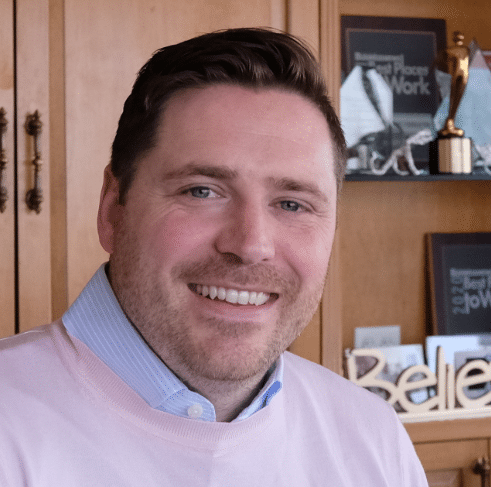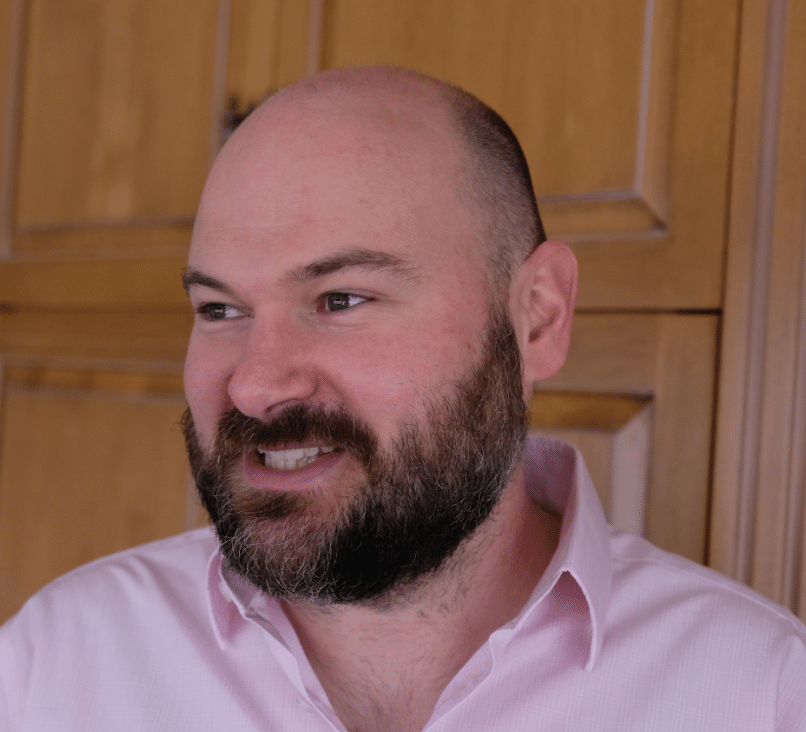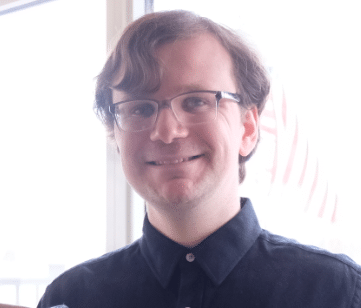Less than 10 minutes after I arrive at Spectrum Designs, Brian, a stocky middle-aged production worker, is standing inches in front of me, looking deeply into my eyes.
I’m snapping photos on a quick tour of the organization’s Long Island headquarters and being introduced to a handful of staff members, most of them on the autism spectrum. Brian, dressed in jeans and an untucked royal blue Spectrum polo, walks onto the printing room floor, and my host says we have to meet.

It happens fast. We shake hands and introduce ourselves. He tells me I look great and lunges for a big, chest-to-chest hug.
And then he pulls inches away and drops a bomb I waited months to say to my own wife after we started dating: “I love you.”
It’s the first time a man has told me this since my dad died in 2017. And it feels every bit as genuine as any time I’ve ever heard it.
“I love you, too, brother,” I say. How could I not?
There’s no pretense here. Everyone is very welcome at what has to be the most remarkable organization in the promotional products industry.
The View From Main Street
Spectrum Designs (PPAI 673690, Silver) may be the ultimate test case for a person’s willingness to accept an inherent value in inclusion, acceptance and belonging, or their newsier moniker – DEI. In this place, everyone is different, literal plot points on a wide spectrum. And yet they bring unique strengths and personalities to make the sum greater.
A promo distributor operating as a nonprofit, Spectrum doesn’t sit in an industrial zone or tucked away in a suburban business park. It lives in a charming downtown, surrounded by cafés and bike riders, with a waterfront view. Its primary facility is the former office of the law firm that represented Exxon in the Valdez oil spill case, on Main Street in Port Washington, New York, which is nestled on the bay that F. Scott Fitzgerald fictionalized in The Great Gatsby. It’s the kind of place where you walk to work. And many of the employees – two-thirds of them on the spectrum and others neurodivergent – often do.
That’s intentional. CEO Patrick Bardsley didn’t want to cast his team out of sight. “For too long, these people really were segregated and pushed to the fringes of our communities,” says Bardsley, who discovered his calling while working as a special needs camp counselor and later went on to earn a master’s in special education.
“We want our employees to be part of the community,” Bardsley says. “They need to be able to support the businesses that support us back. We focus a lot on the social benefit – ‘isn’t this nice, we’ve got people working.’ But the economic benefit is, if anything, more impressive. You are simultaneously diminishing the Social Security needs for someone, creating a taxpayer and feeding back into the system that supports them. They’re spending their money back in the community.”

Patrick Bardsley
CEO & Co-Founder, Spectrum Designs
Inside the building, things are buzzing. Presses hum, and shirts are folded, sorted, boxed and taped for shipping. Merch is everywhere – trophies from past jobs well done. There are photos, awards and signs all over the walls. Some celebrate team members with culture-building shout-outs, others tout high sustainability standards. You can smell the ink and hear the camaraderie.
Since 2011, Spectrum has grown from a converted backyard barn with two autistic teen employees and one heat press into a multimillion-dollar business with 80 employees spread over two locations, plus plans for a franchise model that would soon create outposts in Florida, New Jersey and maybe even Southern California.
The company brought in $6.8 million in promotional products revenue in 2024, up more than 40% over the previous three years. It ranks No. 70 on the 2025 PPAI 100, its first-ever appearance on the annual measure of industry leadership. Through PPAI 100, Spectrum earns High Marks in two categories: Industry Faith – based on its credit rating – and, naturally, Employee Happiness.
Not a Charity – A Challenger
The work is as pristine as any other decoration shop I’ve visited, not in spite of its employees but because of them. Foot-shaped outlines dot the floor, reminding workers where to stand. Once they’re in place, the tasks become second nature. Bardsley’s special education background informs how the company trains each employee, tailoring the teaching to their unique needs.
The Nicholas Center, an affiliated nonprofit helping autistic adults learn critical life skills, provides supervisors. They seem to mostly chat amongst themselves off to the side of the production floor, ready to step in with help or direction if needed.
Shirts are stacked and folded with pleasing symmetry. Direct-to-garment, screen print and embroidery jobs move in rhythm.
Clients range from local high schools to the big New York sports teams. There’s no outbound sales effort; all orders come by word of mouth or through effective marketing that shares the organization’s one-of-a-kind story. They don’t turn down clients. New business creates the opportunity to hire another autistic or neurodiverse adult from the extensive waitlist.
Spectrum exists to employ as many of them as possible. It’s the mission. The whole point.
Because of its staff makeup and its not-for-profit status, Spectrum is in a favorable position to land state contracts and grants, and it does accept donations. But it does not operate as a traditional charity. Bardsley, born and raised in Wales, refers to it as a social enterprise, as does COO Tim Howe, MAS, Bardsley’s childhood friend from back home who came over to help with the growing organization in 2016.
Howe, who had no particular background in promotional products or special education, helped put together the company’s first screen-printing press himself. He also forged Spectrum Designs’ official membership in the promo industry. Denied entry by another organization, which has in its bylaws a strict policy prohibiting nonprofit members, Howe turned to PPAI and its partnership with SAGE to expand the business from soft goods to hard goods. Today, he oversees both locations – Port Washington and Pleasantville, in nearby Westchester County – with a mix of operational rigor and elder brother affection. “It feels like running a real business, because it is,” Howe says. “And, like, I walk out of my office and immediately I’m talking to a team member about Teenage Mutant Ninja Turtles. That’s part of who I am, too.”
Howe tells me of all the office conversations about anime and Star Wars. He tells me what it’s like to work with Spencer, who lords over the darkroom. “He gets to feel like he’s king of something, and that’s kind of how it should be, really,” Howe says.
The employees’ pride matters, because Spectrum holds itself to the same standards as top-tier for-profit competitors. Along with the worthiness of the mission itself, that high standard creates pressure for Howe. But it is necessary.
“We get to spend a lot of time being really excited about proving people wrong,” he says. “But there’s a very tangible feeling of, ‘Hey, if we mess up, then they’re going to blame autism for it.’”

Tim Howe, MAS
COO, Spectrum Designs
It’s painful, and it has happened. In one instance, UPS delayed the delivery for a rush order that was to be sent just 25 miles to New York City. “The customer called me and was like, ‘I stuck my neck out, saying we should use the autistics for this jobs, and you guys [messed] it up. Now we’re not going to have shirts. You made me look like an idiot in front of my executive team.’
“And that sucks, because then you realize there’s an extra, added level of pressure on you to prove that people with disabilities can do a good job,” Howe says.
The unique culture creates its share of advantages that work in Spectrum’s favor, of course. All things being equal, what client wouldn’t prefer to do business with a distributor that has such an important mission? And what employee would choose to leave a place where they feel so at home and accepted? Turnover at the company is nearly nonexistent. “No one ever leaves,” Howe says. “It’s not that they can’t. We had a guy who was like, ‘I actually got offered my dream job, and I’m going to go and work in a vape shop. It’s what I’ve always wanted to do. But thank you guys for giving me the confidence to apply.’”
Viral Good
This visit to Spectrum Designs is the first time since high school – at least I’m aware of – that I have had the extended company of autistic people. I had mostly forgotten how the condition shows up in different individuals. It is, obviously, a spectrum, with the effects more or less apparent in some people than others. Certain individuals have difficulty learning or need to learn in a very specific way. Others don’t recognize typical social norms – eye contact, personal space, conversation topics – and may develop an intense focus on subjects special to their interest or that bring them happiness, structure or comfort.
The people I meet seem to live and work with joy and gratitude. And typically, those feelings are experienced even more by their families, especially parents who just want to know that their autistic adult son or daughter will be OK once they are gone.
“For every parent, your job is to keep your kids safe, protected, hopefully happy and purpose-driven so that you can pass on and hopefully they’ll have a better life than you had,” Bardsley says. “When you have a child with a disability, that becomes just an outright fear. Now those things aren’t a given anymore.”
Estimates vary somewhat, but perhaps 85% of adults on the spectrum are unemployed. Most of these individuals spend time with caretakers or participate in day programs like those provided by The Nicholas Center. Spectrum Designs aims to change that.
Both organizations emerged from this kind of tragedy. In 2010, Long Islander Paul Kitsos, the father of a son with autism – Nicholas – died unexpectedly. To honor the memory of the successful apparel company owner and pro poker player, Kitsos’ family formed The Nicholas Center and Spectrum Designs Foundation, enlisting their son’s camp counselor, Bardsley, as a co-founder in the project.
From two employees, to 10, to 80, Bardsley has built an organization that thrives on its own ambition. He briefly studied business as an undergraduate but credits trial-and-error and YouTube equally for the lessons he has learned to keep Spectrum growing. Over the years, the effort has expanded to a baking company, which has come and gone, and a laundry business that is still going. But the distributorship has been the angle that works best.
“When you think about production of a certain T-shirt or anything in our space, it’s very concrete,” Bardsley says. “You start with a blank. You either embroider it, screen print it, DTF, whatever it is, and then you put in the box by size, by number, and it’s done. There’s a very clear beginning, middle and end, and it’s repetitive. You’re doing that over and over again. You can kind of get some rhythm. So, for someone on the spectrum who thrives on routine, structure and a concrete kind of activity, our industry is perfect.”
That’s not to say Spectrum limits its autistic and neurodiverse employees to line work. It has welcomed them into the front office, too.
I get to spend some time with Kelli Fisher, the company’s marketing and development specialist. She oversees social media and has created numerous viral hit posts, which landed Spectrum on the 2025 PPAI #Online18.
Shy and quiet as a young girl, she was diagnosed with autism spectrum disorder at 14. Doctors told her parents she wouldn’t succeed at college or ever get a driver’s license. She overcame those doubts and earned a degree, but she struggled with stress and fulfillment at times in her career. A hiring manager once ended a job interview within five minutes because she couldn’t keep consistent eye contact.
Things are different for her at Spectrum. She started in the laundry business, then moved to a production role at the distributorship. Two years ago, Bardsley formed a plan to elevate then-social media manager Dylan Valic – himself neurodiverse, with obsessive-compulsive disorder – to marketing director and to make Fisher his direct report. The company now has more than 110,000 followers on Instagram alone, and some posts have achieved more than 25 million views. Fisher has since shared time onstage with Adam Sandler and been interviewed on The Kelly Clarkson Show.
She calls herself “very loud” and “awkward” and says she sometimes has difficulties with time management. But the company rolls with its employees’ differences.
“Spectrum is very understanding,” she says. “If I’m struggling with time management, they’ll help me. Like, ‘What do you need to do to organize your work better?’ Our chief of staff is a licensed social worker, so if I’m ever struggling and need to talk, I can just talk to her. There’s always support here. … Sometimes I’m not good with feedback, but Spectrum tries to give feedback in a way that isn’t as hurtful – they’re not as harsh.”
Valic says his OCD can create extreme doubt and anxiety. But the results as a manager – the kind of brand storytelling wins the biggest companies in the industry couldn’t dream of achieving – speak for themselves.
Howe says Valic is shy, too, but calls him a “marketing genius.” The week before I visit, Spectrum’s story was broadcast on nearly 200 CBS affiliates across the country.
“There were some people that thought it was a terrible idea, that we weren’t ready yet for these roles,” Valic says. “But because Spectrum kind of took a leap of faith and because they were there to offer support and help us get comfortable and help us train, we were able to flourish ourselves and then help the company grow.”

Dylan Valic
Head of Marketing, Spectrum Designs
Right ’Round The Corner
As per its mission, Spectrum will continue to grow. There is the potential for as-yet untapped federal government contracts. There is the franchise model, to be forged through partnering with like-minded organizations across the country that exist for similar purposes. The first Spectrum Designs satellite is set to open in Pensacola, Florida, later this year, to be overseen locally by Global Connections to Employment, an outfit with operations in 14 states.
“We’ll kind of advise them and counsel them, and visit once in a while and say you should do it this way,” Howe says. “I think that is sustainable. … I think once we get out there and do it, it will be transformational.”
The gap to be filled is not small. The CDC recently estimated the prevalence rate for autism at 1 in 31 births. Estimates say 1 in 5 Americans are neurodivergent.
Not all of these individuals will be able to hold a job. But many could, if the space for them to succeed was created.
It strikes me during my visit that one of the challenges to scaling U.S. manufacturing – a hot topic in promotional products amidst increased tariffs on foreign-made goods – could have an overlooked solution. The week after my trip, America’s Secretary of Health and Human Services announces plans for new studies into potential environmental causes of autism. “Autism destroys families, and more importantly, it destroys our greatest resource, which is our children,” Robert F. Kennedy Jr., said on April 16. “These are children who should not be suffering like this. These are kids who will never pay taxes. They’ll never hold a job. They’ll never play baseball. They’ll never write a poem. They’ll never go out on a date.”
I read that quote and think back to Fisher telling me about her home life with her boyfriend. I think of the Spectrum employees who live independently, sharing a house, and of the ones whose parents drop them off and pick them up every day, proud of the lives their children are leading.
I think of all the people finding dignity in their work and in a workplace that allows them to be themselves.
I think of Jason giving me a personal encore of his performance from The Nicholas Center’s ’80s night revue from the evening before – a one-man, twirling rendition of “You Spin Me Round (Like A Record)” by Dead or Alive.
I think of Max, folding shirts while telling me about the cartel of Japanese companies that has tightly controlled the release of new Pokémon these past 30 years.
And I do think of Brian. How could I not?


